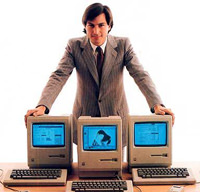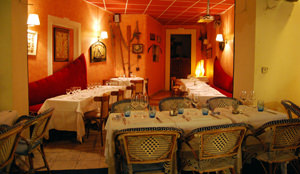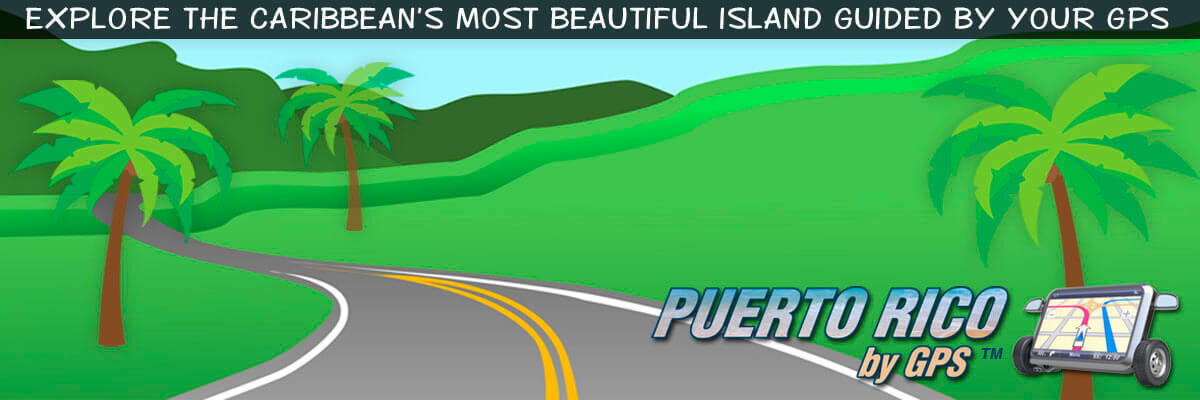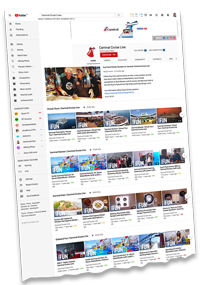 You never get a second chance to make a first impression. Marketers have known this for years. And it goes for good and bad ones (first impressions, that is). So, if this is the case, and we’re all on the same page on this basic marketing principle, why do we see so many poor images both in digital and printed marketing media?
You never get a second chance to make a first impression. Marketers have known this for years. And it goes for good and bad ones (first impressions, that is). So, if this is the case, and we’re all on the same page on this basic marketing principle, why do we see so many poor images both in digital and printed marketing media?
Human beings are visual and emotional creatures. Centuries of civilization have dumbed-down our smell, taste and tactile senses. In many cases our auditory sense has also been diminished by excessive noise levels. Only our vision has managed to survive… sort of.
While we have become increasingly sophisticated in our daily routines, our decision-making process has remained rather primitive (anthropologists call it the lizard brain). We tend to make emotional decisions and justify them on a rational level. Sales people have also known this for years. That’s why the puppy dog close is still so popular.
One of the best ways to incite emotional decisions is through the use of images. The phrase “a picture is worth a thousand words” was popularized in the United States by Frederick R. Barnard back in 1921. Later on the Eastman Kodak Company also used it to promote their photography products. However, history attributes the phrase to Chinese philosopher Confucius in the 5th Century before Christ. And believe me, he wasn’t confused.
The right image can make us happy, sad, angry, jealous, disgusted, hungry and even sexually aroused. The wrong one can garner unexpected results.
As a communicator, living on the island of Puerto Rico, I love to observe and dissect this phenomena. The local advertising world is ridden with bad radio, tv, printed and Internet messages made by people who have never sat once in a communications class. This is not to say that Puerto Rico doesn’t produce quality media. However, many times this sort of message is put together by amateurs who don’t have a clue of what they’re doing and sold to customers who don’t know any better. It’s the blind leading the blind. And this is not to say that the same thing doesn’t happen elsewhere. I suppose that it does. It’s just that I live here and can’t give an informed opinion of what happens elsewhere.

Steve Jobs presenting the original Macintsoh computer in 1984.
There are reasons that have brought us to where we are today. For one, the explosion in digital media led on by the desktop publishing revolution in 1984, and propelled a thousandfold by the Internet in 1990, has caused a modern day gold rush. Overnight experts have popped up like mushrooms in every possible market niche, begging the question: “how can you be an expert on something that changes daily”? But I digress, back to “first impressions”.
In addition to an overflowing abundance of “publishing experts” we now have “experts” in every conceivable aspect of the communications function. Some actually know what they’re doing while others don’t have a clue. Sifting the wheat from the chaff can be pure torture.
How did we get here?
Answering this question would take an entire book, let alone a blog article like this one. We could mention technologies like MP3, JPEG, digital cameras, digital audio, PDF, HTML, PHP, MySQL and JQuery, all brandished by people who otherwise wouldn’t have come anywhere close to the communications profession.
These technologies enable the world that we live in today, albeit at a cost. MP3 and JPEG are lossy technologies meaning that the final product is always worse than the original. Digital cameras and recorders use these technologies to turn everyday people into overnight recordists and photographers. According to Business Insider we are now posting a staggering 1.8 billion photos a day to social media. Good luck getting noticed with that amount of clutter.
Video is even worse. According to Statista in 2019 500 hours of video were uploaded to YouTube every minute. Audio is a little better, but with the explosion of podcasting it will be just as bad in a couple of years.

You could argue that most of this material is futile, that it’s mostly videos of cats and people trying crazy stunts on camera. Maybe Steve Jobs had it right when he called it “vanity press”. But the fact remains that humanity is suffering a sensory overload that numbs whatever senses we might have left. And when we drown our potential customers in a sea of ill conceived messages we stamp out any possibility of ever reaching them again. Why? Because you never get a second chance to make a first impression.
Then there’s ignorance… the people that don’t know what they don’t know
Several months ago I spoke to a group of professionals in the tourism industry about ways to promote their businesses in a highly competitive market. I could tell by the look on their faces that they weren’t believing a word I said.
I remember mentioning that their target customers were not attracted by the amenities of their individual properties but rather by the attractions in their surroundings. I also mentioned the way they should construct their marketing messages in order to emphasize fun instead of features. I used the Disney and Carnival Cruises websites as examples of how it should be done. Hell, the Carnival Cruises website is so obvious that it even has the word FUN written over each photo on the home page. Duhh!!!
Disney doesn’t tell you how large their parks are, or the length of their rides. They show mom, dad and the kids having fun. And after they show you dozens of people enjoying themselves you arrive at your own conclusion.
Carnival Cruises doesn’t tell you how the ship is built or that it has pools, restaurants, discos, theaters, game rooms, gyms, stores or any other amenity. You expect that, and they show you hundreds of people enjoying those facilities. They SHOW YOU!!!
The message isn’t me, me, me, me, me… It’s you, you, you, you, you. You having FUN!!!
I’ve always been amazed at how meeting facilities, restaurants, bars, lounges and hotels of all sizes in Puerto Rico use pictures of empty spaces to promote their properties. So much for first impressions! I suppose the rationale is to save on modeling fees or photographer rights. Or maybe they just don’t understand copyright law. Or even worse, maybe they’re just cheap or lazy. Well guess what? It’s a fools errand, because empty spaces automatically raise red flags in customer’s minds. After all, they must be empty for a reason, right?
Many years ago, when I was a young man and was starting to travel, I recall a suggestion made by Rick Steves in one of his hundreds of travel videos. Steves suggested that you should always favor busy restaurants over empty ones, which goes completely against conventional wisdom. So why did he suggest such a thing? Because busy restaurants are busy ‘cause they’re good. The opposite is frequently true as well.

How does this picture make you feel? Do you find the place inviting? Why is it empty if it’s so good? First impressions are everything. Click on image to see it larger.
When we post pictures of empty spaces, be it meeting facilities, restaurants, bars, lounges, hotels, rental cars, tours or anything else that has to do with people, we are sending a message straight to the customer’s subconscious mind that screams “THERE’S SOMETHING WRONG HERE”. This causes confusion and friction in his/her mind; two things that are poisonous pills in the marketer’s mind. Why? Because a confused mind doesn’t make decisions. Once again… “first impressions”.
Last week I saw an ad promoting local tourism in Puerto Rico and it was the same old story: empty pools, restaurants, bars, beaches, rooms, conference rooms… What happened? Where all the people abducted by aliens? It’s obvious that the message hasn’t gotten through.
So let me be as blunt as possible. Tourists don’t care about you. They care about themselves. Instead of wasting money showing empty facilities, why not show local amenities and end your communication piece talking about your place? Tourists aren’t different than you or I. They look for information first and then they book their trip. Without the former they could care less about the later.

This photo doesn’t need a caption. People are having fun so the place must be good. First impressions are everything. Click on image to see it larger.
And forget about ads. Nobody reads them anyway. Especially when they’re done wrong. Think YouTube, podcasting, blogging… And notice how I’ve purposely left out traditional social media. It’s because the algorithms that control these sites have gotten so restrictive that no one is going to see your stuff anyway.
I publish videos about Puerto Rico all the time. I make them 95% information and 5% promotion. And you know what? People watch the videos, visit the Island and then they write me saying how much they enjoyed their time on the Island. Not once have they told me about their hotel, or the car that they rented, or the airline that they flew. Of course, they didn’t sleep under the stars, or get around on foot, or swim their way to the Island. But that wasn’t what got burned into their memory chip. That’s not what they’ll remember 20 years from now.
A Little Restaurant In Madrid
 Let me tell you a story about first impressions, or rather about “neuro-associations” as Tony Robbins would call them. Back in 1984 I visited Spain for a 30 day period. My wife and I went there on our own, like we always travel. We rented a car and just hit the road. I spent my first 5 days in Madrid, on a second-floor room near Plaza Del Sol. Back then Plaza del Sol served as a giant bus stop. Not the main bus terminal for the city, but one where there were usually 15–20 buses at all times.
Let me tell you a story about first impressions, or rather about “neuro-associations” as Tony Robbins would call them. Back in 1984 I visited Spain for a 30 day period. My wife and I went there on our own, like we always travel. We rented a car and just hit the road. I spent my first 5 days in Madrid, on a second-floor room near Plaza Del Sol. Back then Plaza del Sol served as a giant bus stop. Not the main bus terminal for the city, but one where there were usually 15–20 buses at all times.
In the morning the diesel fumes would seep through our window (even though it was closed) and impregnate the room with an intense diesel odor. Well, believe it or not, to this day the smell of diesel fumes takes me straight back to Madrid. With other people it can be the smell of bread, or candy, or a certain food. It happens to all of us.
What’s funny is that it doesn’t only happen with smells, it can happen with any sensory stimulus. That’s why we remember where we went, and what we did, on trips that we took decades ago and we don’t remember where we stayed or where we ate. We remembre the fun stuff because it’s tied to our sensory feelings. Here’s another example. I was at Yellowstone National Park three years ago during the month of June. To this date I can tell you how the forest sounded, how it smelled, what the temperature was like and how it made me feel. However, I can vaguely tell you what my hotel room was like!
And by the way, that’s because it was good. If my hotel experience had been bad I would remember every detail. Why? Because it would be tied to emotion. Anger, that is! That’s why people who have a good experience tell an average of four people and those that have a negative one tell an average of ten. They also remember bad experiences for a far longer time.
Case in point, on that same trip in 1984 my wife and I spent 11 days in Italy and two days in France. The two days were spent going to and from Italy along the southern coast of France. The french people were rude, arrogant and all-around unfriendly. So much so that we’ve never gone back. They can be the most spectacular country in the world and my wife and I will never set foot there. Nor will we recommend it to anyone. First impressions my friend… first impressions.
Reality Check
Right now the world is on hold. Covid-19 has seen to that. The second wave is coming like a freight train and entire countries are shutting down. People aren’t taking vacations. They’re taking “staycations”. Some are even taking “nocations”. We must accept the fact that most tourists aren’t stupid, so they’re not going to come regardless of how much we spend on ads. That’s why the ads you see are aimed at locals. But we all know that local tourism is hardly as lucrative as the international variety.
Another fact is that the crisis will eventually be over. A vaccine will finally be approved, whoever is going to die will die, and the rest of humanity will acquire herd immunity and move on. Sad? Yes. Crude? Maybe. And here’s another fact for you to chew on: “it’s not going to happen next month”! It’ll probably take a year or so
So what can we do? Well, let me start by what we shouldn’t be doing. Yesterday I saw an article in the paper about an exhibit put together by our local Tourism Company. The objective was to tell the public about all the “good things” that they’ve done throughout the years. Maybe they have, but who cares? Like the saying goes: “aguas pasadas no mueven molinos”. In the rare case that you might not understand Spanish, that means more or less that it’s all “water under the bridge”. What I care about is what they’re going to do tomorrow… next week… next year.
And, of course, exhibits aren’t free. The Tourism Company has to contract all sorts of professionals to design them, put them together and man them. Just to tell us how “great they’ve been”.
That money would be better spent helping local operators get through the crisis. Help could be in the form of local stimulus packages, small loans, tax incentives… who knows. All those “creative minds” should be able to come up with something.
They could also use all that bottled-up creativity to start publishing YouTube videos, writing blog articles, going on podcasts, publishing on LinkedIn, posting Tick Tok clips, I don’t know… telling the world about Puerto Rico. Not about empty spaces, but about the fun stuff; about what it’s like to spend a week or two “in paradise”.
Regardless of how bleak the picture might seem at the moment, tourism isn’t dead. It’s just dormant, like the trees in winter. All those tourists are sitting at home, sheltering in place, just waiting for the crisis to be over. And what do you think they’ll do with all that idle time? They’ll watch videos, read articles, listen to podcasts and suck up as much information as possible. That way, when the floodgates finally open, they’ll hit the ground running. There’s even a word for this new breed of potential visitors. They’re being called: “armchair tourists”.
So Here Are The Facts
Tourists aren’t coming. Get over it. They’re hunkered down at home, soaking up information. They’ll go back out when they feel secure. When they finally come out they’ll go to the places that they discovered while they were hunkered down. We can influence that decision NOW by providing useful information about Puerto Rico. And please notice that the operational words here are: “useful information”. Not advertising.
Today’s web surfers can detect an ad from miles away. They also detect “marketing speak” and just plain old bullshit. And they resent it. That doesn’t mean that you can’t put your hotel logo at the bottom right corner of your videos (by the way, we call that a bug in the video biz) or mention your business briefly at the end of the program. But the main message can’t be about you or your business, because quite frankly “people don’t care”.
However, if you serve good information, and pepper it with the ocasional commentary about your place of business, they not only will accept it but they’ll also remember it. And guess who’s place they’ll look for when they finally come to the Island?
A while ago I mentioned “neuro-associations”. Well, I still remember the name of the place where I used to have dinner in Madrid 36 years ago. They never handed me a promotion. I never read one of their ads. In fact, they had just opened, so they didn’t even have a credit card machine. They just treated us right. So when I think of great food in Madrid their name just pops into my mind. Maybe they don’t even exist anymore. Who knows? But you can bet your bottom dollar that when it comes to food, if I’m ever back in town, they’re going to be my first option.
That’s the kind of connection that you want to establish with future visitors, and you can start today!
©2020,Orlando Mergal, MA
____________________
Bilingual Content Creator, Blogger, Podcaster,
Author, Photographer and New Media Expert
Tel. 787–750-0000, Mobile 787–306-1590


